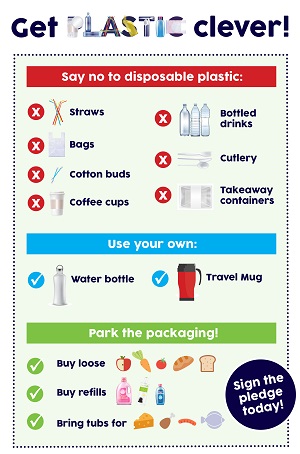The need to reduce plastic waste has never been greater.

The amount of plastic waste in the UK has reached a crisis point, with some councils stopping plastic recycling and reports of stockpiles of plastic waste.
Thankfully, though, public interest in cutting down on plastic waste is at an all-time high.
Reducing single-use plastic is a challenge – it seems like everything comes wrapped in the stuff, from toys to food. There are government plans to cut down on it, and further EU legislation on the way, but the timescales are far off.
Each of us can act now, though. Follow our tips below for cutting your plastic footprint.
Plastic-Clever Cumbria pledges
Ready to make some pledges to reduce plastic in different ways? Choose from more than a dozen actions in the Plastic-Clever Cumbria pledge scheme. Simply visit the online form and tick the ones you’re prepared to do.
The scheme is coordinated by Penrith Action for Community Transition with the support of environmental groups from across the county and Cumbria County Council.
Find out more
Get lots more tips on reducing single-use plastic here in Cumbria:
Check with your local sustainability group for initiatives in your district. See groups in Cumbria >>
Plus, check out the Zero Waste Home website.
National & international:
- UK Government’s environment policy (includes measures to tackle plastic)
- EU ban on single-use plastics
- UN launches Global Plastics Platform
1. Buy loose
Buy loose products instead of packaged ones.
You can generally find loose produce like fruit and veg in local greengrocers and some supermarkets.
Some health shops sell loose dried goods, like nuts, seeds, dried fruits and pasta. Look out for zero-waste shops popping up around Cumbria, where you can get a wide range of goods unpackaged and plastic-free. Here are some we know of:
- Carlisle: Enviro-Rheino
- Kendal & Penrith: Another Weigh
- Ulverston: Cut the Wrap
2. Bring your own tubs
When you go shopping for fish, meat, cheese and other deli products, bring your own tubs so they don’t end up wrapped in plastic.
Most independent shops will happily oblige, and supermarkets like Morrison’s are actively promoting it.
Also use tubs and jars instead of cling film, tin foil or plastic bags for food like:
- packed lunches
- leftovers
- ingredients
- foods you’ve used part of, like tinned or fresh fruit, meats and cheese
You can also buy reusable wax wraps instead of cling film.
3. Cook from scratch
Fresh ingredients tend to come in less packaging than ready-made, processed foods.
Grab your recipe book and plan a few meals each week using fresh ingredients that you can buy loose or in your own tubs.
4. Refill for drinks
Are plastic drinks bottles swelling your recycling box? One idea is to have a reusable bottle for each member of the family, and fill those with your favourite drinks instead of buying single-use bottles of water, juice and fizzy drinks.
One bottle of concentrated juice drink that you dilute with water generates less waste than lots of small snack-size bottles, and will typically cost less as well.
There are now Refill schemes in towns around Cumbria, where shops and other places on the high street will fill your water bottle with tap water for free. Download the Refill app to find places near you while you’re out and about – you’ll find it on your usual app store.
5. Refill toiletries
Many health food shops and zero-waste shops sell refills of products like:
- washing-up liquid
- laundry gel
- shampoo
- conditioner
- liquid soap
Bring your own bottles and reuse them for refills.
6. Bring your own...
Use your own cutlery, straws and travel mug to cut down on disposable ones.
One idea is to keep some in the car, so you have them with you when you’re out and about.
Travel mugs can be tricky, as they’re larger. How about a Pokito? These clever British-made mugs fold down so they fit in your pocket.
7. Use your own bag
Use your own shopping bag rather than disposable plastic ones.
If you keep forgetting to bring some, look out for the ones that pack down to palm size and keep one in your bag.
Throw a few in the boot of the car so you always have one when you need it.
8. Buy in bulk
Buying bigger packages and bottles of household items is a great way to take home less plastic.
Look for bulk options when you’re out shopping, and you can then refill smaller containers to use around the home.
